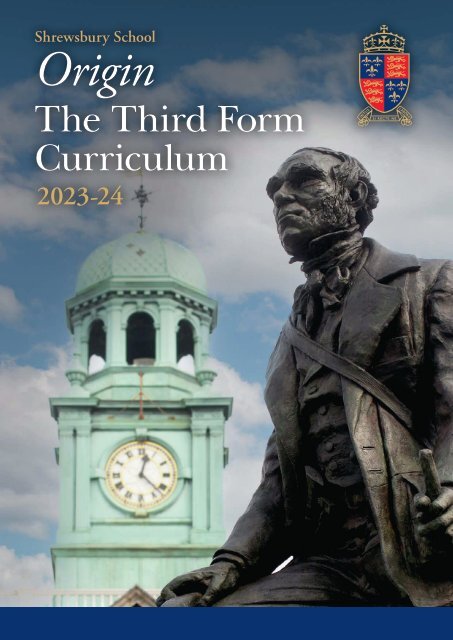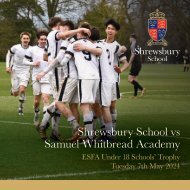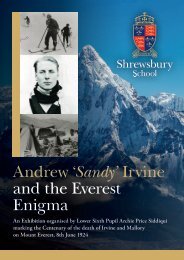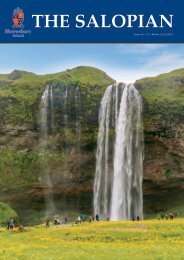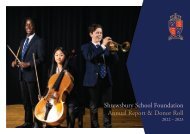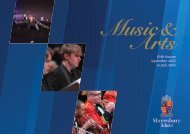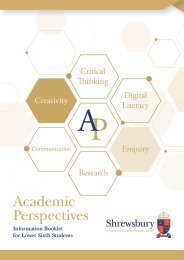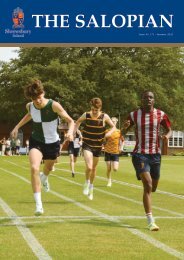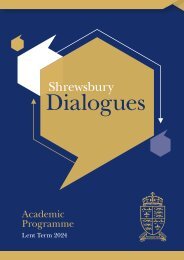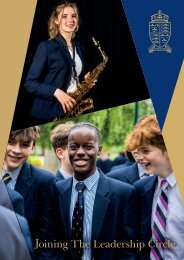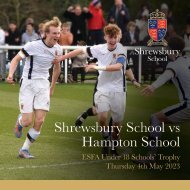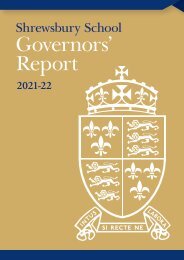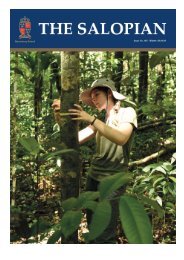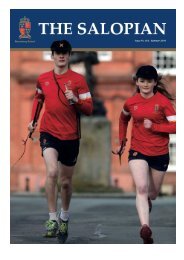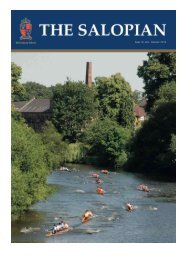Third Form Curriculum 2023-2024
- No tags were found...
Create successful ePaper yourself
Turn your PDF publications into a flip-book with our unique Google optimized e-Paper software.
Shrewsbury School<br />
Origin<br />
The <strong>Third</strong> <strong>Form</strong><br />
<strong>Curriculum</strong><br />
<strong>2023</strong>-24
Contents<br />
Introduction 4<br />
The <strong>Curriculum</strong> Structure 5<br />
Subject Information<br />
Languages 8<br />
Mathematics 11<br />
English 12<br />
Sciences 13<br />
Humanities 15<br />
Practical Subjects 16<br />
Personal and Social Development (PSD) 18<br />
2<br />
3
Introduction by<br />
The Deputy Head<br />
The first year of a new school is a significant milestone<br />
in any young person’s academic development.<br />
As our <strong>Third</strong> <strong>Form</strong> pupils embark on a voyage of<br />
personal discovery which will ultimately define<br />
their character as an adult, we take seriously<br />
our responsibility to inspire a deep love of<br />
learning and to bring them into contact with the<br />
complexities of the wider world.<br />
Our <strong>Third</strong> <strong>Form</strong> <strong>Curriculum</strong>, which we call<br />
Origin, in a nod to our famous alumnus Charles<br />
Darwin, goes beyond the routine expectation<br />
of making sure pupils come up to a common<br />
standard, ready to embark on their GCSE courses.<br />
It is designed to make sure that all our pupils<br />
encounter fresh ideas, are intellectually challenged<br />
and are made to think critically about their<br />
own learning right from the start. It provides an<br />
opportunity for pupils to continue to develop<br />
expertise in subjects they already know they enjoy,<br />
to reignite their passion for subjects that they have<br />
previously studied in different contexts and also<br />
to study certain academic disciplines for the first<br />
time.<br />
This document sets out the academic year ahead<br />
and the course content for each discipline. The<br />
diversity and scope of opportunity is vast and yet,<br />
at the same time, every faculty is united by three<br />
common goals:<br />
To ensure all pupils understand that academic<br />
study is neither restricted by traditional subject<br />
boundaries, nor determined entirely by routes<br />
to qualification.<br />
The <strong>Curriculum</strong><br />
Structure<br />
The Origin curriculum combines both breadth and depth,<br />
so that pupils get a wide range of academic experiences in<br />
sufficient detail to make informed GCSE choices.<br />
The list of subjects is below and a synopsis of the course content for each subject follows later in this<br />
guidance document.<br />
The Origin <strong>Curriculum</strong> - List of Subjects<br />
Mathematics<br />
English<br />
Sciences: Biology, Chemistry, Physics, Computer Science<br />
Modern Languages: French, German, Spanish<br />
Classical Languages: Latin, Classical Greek<br />
Humanities: Geography, History, Philosophy & Theology (PT)<br />
Practical Subjects: Art, Design & Technology (DT), Drama, Music, Physical Education (PE)<br />
Personal and Social Development (PSD)<br />
Subject Choice<br />
To ensure a broad, exciting and balanced<br />
curriculum, pupils will study all of the subjects<br />
listed above, with the exception of languages,<br />
where there is an element of choice. Pupils<br />
will select two subjects from French, German,<br />
Spanish and Classical Greek.<br />
Pupils and their parents will make their choices<br />
via an online form in the summer before arriving<br />
at Shrewsbury. Information on each subject and<br />
how to make these choices is provided later in<br />
this document.<br />
To ensure that all pupils reach a high level<br />
of proficiency in key areas of competency:<br />
Literacy, Numeracy, Physicality, Creativity,<br />
Digital Skills, Cultural Appreciation and<br />
Communication.<br />
To ensure that all pupils engage actively in<br />
their learning and participate wholeheartedly<br />
in activities designed to build confidence, selfawareness<br />
and reflection in conjunction with<br />
the co-curricular aspects of their education.<br />
It is our experience that by making sure<br />
that all pupils are enjoying and contributing<br />
wholeheartedly to a broad and holistic<br />
education, they accrue the necessary knowledge,<br />
understanding and skills to produce the sort of<br />
exceptional exam performances reported year on<br />
year at Shrewsbury.<br />
Richard Kowenicki,<br />
Deputy Head (Academic)<br />
June <strong>2023</strong><br />
4<br />
5
Digital Skills and Artificial<br />
Intelligence<br />
In an age where technology, specifically<br />
Artificial Intelligence, influences how we learn,<br />
we feel that the critical skills required for the<br />
efficient use of technology are best embedded<br />
within each academic subject, with different<br />
academic faculties taking responsibility for<br />
different aspects of delivering our EQUIP<br />
digital skills curriculum. Pupils bring their<br />
Microsoft Device to every lessons and they<br />
can see the benefits and pitfalls of the use of<br />
technology in an applied context.<br />
Assemblies and Extension<br />
Beyond the traditional curriculum lessons, pupils can also look forward to surveying the global picture,<br />
both through their weekly tutorial sessions (following a programme developed by the Head of <strong>Third</strong><br />
<strong>Form</strong>) and through regular year group assemblies. Those who wish to go further in any subject will find<br />
serious enthusiasm from their teachers. They can make use of Faculty extension resources and are also<br />
warmly encouraged to take part in academic competitions and attend the wide range of lectures which run<br />
throughout the year, from high-profile internationally renowned academic speakers to pupil-led presentations.<br />
Setting<br />
EQUIP<br />
<strong>Third</strong> <strong>Form</strong> pupils arrive at Shrewsbury with a range of experiences across different subjects. Pupils are<br />
streamed in Maths and in English, as our experience is that this benefits all pupils, allowing them to learn<br />
at a rate appropriate to their experience and ability. Languages will be set according to prior experience. All<br />
other subjects, including the sciences, humanities and practical subjects have mixed-ability sets. Our approach<br />
to setting in the <strong>Third</strong> <strong>Form</strong> is necessarily responsive and the needs of pupils are put first. An allocation or<br />
change of set should never be viewed as a cause for concern, but a positive step to ensure the best possible<br />
progress.<br />
Learning Support<br />
For those who would benefit from it, we have an excellent and well-equipped Learning Support team who work<br />
with teachers and pupils to assist them in accessing the learning experience and realising their potential. We also<br />
offer English Language support to those for whom English is an additional language.<br />
Tutoring<br />
Every pupil has a personal tutor and is part of a small tutorial group within the House context. This tutor will<br />
work hard to get to know their tutees well - encouraging them in their endeavours, commending them on<br />
their successes and, of course, supporting them through inevitable moments of disappointment. They meet<br />
with their tutor group once a week in a dedicated slot, but there is likely to be a much higher level of informal<br />
contact as they encounter each other around the school site. The tutor will also monitor academic progress<br />
and comment in reports, offering advice and guidance on time management, methods of learning, revision<br />
planning and all other relevant matters.<br />
GCSE Options<br />
At the end of the Michaelmas Term, The Deputy Head (Academic) will publish a booklet to parents and<br />
pupils outlining the available courses and possible subject combinations for GCSE study during the Fourth<br />
and Fifth <strong>Form</strong>s. In the Lent Term, the Head of <strong>Third</strong> <strong>Form</strong> will further outline the choices process for pupils<br />
and they are encouraged to research thoroughly, making use of the guidance provided by their Housemaster<br />
or Housemistress. Indicative GCSE choices will be made at the end of the Lent Term.<br />
Academic Communications with Parents<br />
Pupils and parents will receive two reports in the Michaelmas Term, one report at the end of the Lent Term<br />
and one report at the end of the Summer Term. Individual subject teachers will offer comments alongside<br />
descriptors for effort and attainment. The overall content of the report will be summarised by either the<br />
Housemaster or the Tutor depending on the point in the cycle. The <strong>Third</strong> <strong>Form</strong> Parent Consultation takes<br />
place in the Lent Term and will be focused on academic progress and selection of GCSE Options. Parents<br />
who would like clarification on a particular issue or have a concern are more than welcome to e-mail,<br />
telephone or arrange a meeting with key personnel at any time. The key point of contact for this is the<br />
Housemaster or Housemistress.<br />
Exams<br />
Pupils will take an informal Progress Test in each subject at the end of the Michaelmas Term. The primary<br />
purpose of these tests is to give pupils a good indication of their own progress in each subject and to inform<br />
teachers where set choices are to be made. These should not be regarded as formal exams. Pupils will take<br />
more formal exams, designed to review the year’s work, at the end of the Summer Term. Exam results are<br />
reported to parents as part of the relevant reporting cycle.<br />
6<br />
7
Subject<br />
Information<br />
Languages<br />
Languages form one of the most important components of the Origin <strong>Curriculum</strong>. Modern Languages<br />
have ever-increasing relevance to the globalised world of work and language skills are increasingly sought by<br />
employers in a wide range of fields, including finance, engineering, the diplomatic service, business management,<br />
journalism and creative media, among others. The study of Classical Languages at Shrewsbury is equally<br />
intellectually rigorous and helps pupils gain important understanding of the mechanics and structure of<br />
language, as well as incorporating elements of classical civilisation.<br />
What choices do I need to make?<br />
All <strong>Third</strong> <strong>Form</strong> pupils at Shrewsbury must choose two subjects from French, German, Spanish and Classical<br />
Greek. Information on each subject is provided in the pages that follow and should help pupils and their parents<br />
decide which languages they would like to study.<br />
Parents will be asked to complete an online form during the summer prior to arriving at Shrewsbury expressing<br />
their child’s preferences, as well as stating the level of experience of each language for setting purposes. We cater<br />
for all levels of experience and have three categories to select.<br />
Beginner - no prior experience of studying the<br />
language.<br />
Intermediate - some experience of studying<br />
the language (e.g. 1-2 years or preparation for<br />
Common Entrance).<br />
Advanced - significant experience of studying<br />
the language (e.g. Scholarship or native<br />
speaking experience).<br />
We use the information provided as a guide to<br />
form our classes at the start of term and will adapt<br />
our setting to the needs of the pupil as the year<br />
goes on.<br />
Any parent wishing to discuss language choice is<br />
very welcome to contact:<br />
Mr Tim Whitehead,<br />
Head of Modern Foreign Languages<br />
Email: tcw@shrewsbury.org.uk<br />
Mr Paul Fitzgerald, Head of Classics<br />
Email: pgf@shrewsbury.org.uk<br />
Modern Languages<br />
French<br />
With more than 300 million speakers over five continents, French has secured its status as a lingua franca of<br />
culture, art and cuisine, and is an official language of the UN. At Shrewsbury, we aim not simply to focus on<br />
exam preparation but on empowering students to become thriving linguists with a love of francophone culture.<br />
The Origin course in French challenges pupils with advanced grammar, in addition to literary, cultural and<br />
linguistic challenges. For example, we study a historical French film, use a variety of authentic resources in<br />
lessons and look more widely at a range of Francophone countries.<br />
Cultural and cross-curricular topics are seen as taking pupils beyond the requirements of the GCSE<br />
specification. Motivation and independent learning are thereby enhanced and pupils of all experiences are<br />
encouraged and supported to work towards the same high levels.<br />
German<br />
German is the most spoken mother tongue in Europe with over 100 million people speaking it as their first<br />
language. Learning German greatly enhances educational and career opportunities, and at Shrewsbury the<br />
German Faculty aims to give Salopians the opportunity to speak the language to a very high level and to stand<br />
out from the crowd, with considerable success at GCSE, A Level and Oxbridge level in recent years. It remains<br />
a popular subject at Shrewsbury and is perfectly suited to pupils with limited or no experience of studying<br />
European Modern Foreign Languages.<br />
Most pupils studying the Origin German course start with no previous knowledge of the language and we try<br />
to make the learning experience as fun, interactive and enjoyable as possible, while maintaining grammatical<br />
rigour and the discipline of regular vocab-learning. Moreover, we aim to foster self-confident expression through<br />
our intensive focus on oral and aural skills, pronunciation and fluency, both in the classroom and with our<br />
conversation assistant.<br />
Spanish<br />
Spanish influence, both linguistic and cultural, is broad and rich in so many areas of the globe and for so many<br />
people. With approximately 450 million Spanish speakers worldwide in over twenty countries, it is a language<br />
that is growing in importance. The Spanish Faculty aims to provide another perspective on the World, removing<br />
barriers and allowing students to develop a number of transferable skills for their future. The learning of Spanish<br />
is not only aimed at linguists but also at anyone that wants to strengthen their knowledge and understanding<br />
of social and cultural issues. We promote innovative and engaging teaching which is always linked to the<br />
contemporary Hispanic World.<br />
The Origin course is adaptive and flexible, exploring a wide range of topics and linguistic skills. A solid base of<br />
grammar and vocabulary enables students to start using the language as soon as possible. They can then explore<br />
different topics that empowers them to start conversations and be able to express themselves and explore a<br />
completely different culture.<br />
8<br />
9
Classical Languages<br />
Latin<br />
The Origin Latin course for <strong>Third</strong> <strong>Form</strong> pupils<br />
endeavours to embrace the most engaging aspects<br />
of the Roman world; the language, the literature,<br />
and the lives of people and their day-to-day<br />
experiences in ancient Rome, Pompeii and Britain.<br />
The over-riding focus throughout is connecting the<br />
past (linguistic, cultural, philosophical, practical)<br />
with the present; the joining of the ancient world<br />
as it was, and as it is seen today, with its origins<br />
in the Roman Republic and Empire. Through the<br />
background and cultural studies element of the<br />
course, pupils will learn how Rome has shaped<br />
the 21st Century, with a focus on the elements<br />
that can be seen in modern Britain, including<br />
Shropshire. Pupils will also have the chance to<br />
study in detail the relationship between Latin and<br />
its modern linguistic descendant, Italian, in the<br />
‘Latin Legacy’ module.<br />
Pupils will be taught a mixture of cultural<br />
heritage and Latin language. The content will<br />
be differentiated depending on experience,<br />
with beginners being gently introduced to<br />
Latin language. The course aims to provide<br />
an educational experience that is stimulating,<br />
thought-provoking and enjoyable.<br />
Classical Greek<br />
2,500 years on from their conception, the study<br />
of the ancient works of Greek authors, statesmen,<br />
philosophers and conquering generals gives us a<br />
unique lens through which Shrewsbury pupils<br />
are reminded of the themes, theories, concepts<br />
and values which still resonate with us today. A<br />
significant proportion of our English vocabulary<br />
has its roots in Classical Greek and Shrewsbury<br />
has a long and proud tradition in the study of the<br />
language; a former Head, Benjamin Hall Kennedy<br />
(Headmaster 1836-1865) is famous among<br />
classicists and pupils still have the opportunity to<br />
study Classical Greek ab initio in the <strong>Third</strong> <strong>Form</strong>,<br />
as they did in the 19th Century.<br />
In deciding whether to choose Classical Greek, it is<br />
worth bearing in mind that the pupils who make<br />
a success of it will have already made a successful<br />
start with their Latin and enjoy the challenge<br />
of studying an ancient language. Indeed, some<br />
pupils will have already begun to study Greek at<br />
Prep School, but most have not, and beginners are<br />
warmly encouraged to choose Classical Greek.<br />
Mathematics<br />
Mathematics is a very popular subject at Shrewsbury, and the<br />
Faculty is the largest in the School for a single subject. All pupils<br />
study towards GCSE Mathematics and, in addition, the most able<br />
pupils take the Free-Standing Maths Qualification in Additional<br />
Mathematics in the Fifth <strong>Form</strong>.<br />
The Origin course in Mathematics focuses on the mastery of techniques studied in earlier years, while beginning<br />
to unveil the mystery of additional areas of the subject. In the Michaelmas Term we focus entirely on noncalculator<br />
work, with an emphasis on formalising the methods required for core topics in number, algebra<br />
and geometry. In the Lent Term we introduce pupils to the use of calculators in the context of producing<br />
rigorous and systematic written solutions, and they can then apply these skills to areas such as percentages and<br />
trigonometry.<br />
There will be many opportunities to develop problem-solving skills - an essential part of the GCSE course - with<br />
the top two sets being invited to enter national competitions such as the Intermediate Mathematics Challenge in<br />
February each year. Internal competitions offered by the Faculty include the opportunity for pupils to research<br />
an area of mathematics of their choosing and present their findings, while another competition comprises a<br />
weekly series of progressively more demanding and unusual puzzles.<br />
Pupils are continually assessed throughout the year in Mathematics, with resetting opportunities during the<br />
Michaelmas Term, and again later in the academic year, to ensure they are being taught at the appropriate pace<br />
for them, and at the necessary depth in all topics.<br />
In keeping with the Shrewsbury School spirit, we like to provide pupils with a rich and diverse experience.<br />
Guest speakers are invited to present fascinating talks, and trips to university lectures have also proven very<br />
popular. The Faculty’s Twitter page is regularly updated with news, events and webinars for members of the<br />
Shrewsbury School community who would like to broaden their mathematical knowledge beyond the classroom.<br />
10<br />
11
English<br />
English plays a pivotal role in the Origin curriculum; our aim is<br />
to support and develop the learning of other subjects through the<br />
consolidation and development of the technical skills of reading<br />
and writing, as well as encouraging students to begin to study<br />
literature more independently.<br />
Pupils follow a comprehensive language syllabus,<br />
focusing on spelling, punctuation and grammar,<br />
with cross-curricular input from other faculties.<br />
Each term is devoted to the study of a different<br />
form of literature, beginning with a prose text<br />
in the Michaelmas Term. Novels taught range<br />
from classic texts, such as Charles Dickens’ Hard<br />
Times, to more contemporary works, such as<br />
Philip Pullman’s Northern Lights. The Lent Term<br />
is devoted to the study of Shakespeare; our aim<br />
is to encourage pupils to develop confidence in<br />
exploring Shakespeare’s language, as well as an<br />
appreciation for his skill and power as a dramatist.<br />
Pupils are also invited to explore the context in<br />
which the plays were written. This leads neatly<br />
into the study of an anthology of poetry in the<br />
Summer Term, often focusing on a particular<br />
theme, for example: War or Relationships. A range<br />
of oral and written assignments are produced on<br />
all literary texts, during the year - with at least one<br />
substantive piece of writing on each.<br />
Unsurprisingly, we believe that reading is central<br />
to pupils’ progress in all areas of the curriculum.<br />
All <strong>Third</strong> <strong>Form</strong> pupils have a weekly slot devoted<br />
to individual reading, during their English lessons.<br />
The Faculty works closely with the Moser Library<br />
to establish and promote the value and enjoyment<br />
of reading amongst <strong>Third</strong> <strong>Form</strong> students. There<br />
are also opportunities for Creative Writing, Public<br />
Speaking and Debating.<br />
The Origin English programme endeavours<br />
to produce pupils who are ready to tackle the<br />
demands of the GCSE Language and Literature<br />
courses with confidence and enthusiasm.<br />
Sciences<br />
Biology<br />
Most children grow up with innate fascination<br />
for science: particularly for wildlife, and for the<br />
human body. Children are also growing up in a<br />
society in which Biological Sciences are ever more<br />
relevant: hardly a day goes by without headlines<br />
being made in fields like health, genetics and<br />
environment that can affect our future wellbeing<br />
or shed new light on our origins.<br />
It is the aim of this Faculty to nurture our pupils’<br />
existing interest in Biology through varied,<br />
fun, interactive and practical teaching and to<br />
inspire them to see the continued importance of<br />
Biology in their own lives and the wider world.<br />
Investigative skills and an appreciation for the<br />
scientific method are developed from day one:<br />
we need to train a new generation of scientists<br />
able to ask, and answer their own, new questions.<br />
Studying Biology also helps to develop both<br />
numeracy and literacy and can provide the<br />
analytical skills and technical understanding that<br />
can open doors to many fulfilling and meaningful<br />
careers, and we try wherever possible to refer to<br />
real world applications of biological theory - for<br />
example in biotechnology.<br />
Chemistry<br />
The principles of Chemistry underpin our<br />
understanding of the world around us and are<br />
relevant to all areas of science, from the chemical<br />
processes in living organisms to the formation<br />
of stars millions of miles away. Chemistry is a<br />
vertical subject and so the Origin course starts with<br />
the basics. Atoms are the building blocks of the<br />
Universe and we study their structure: how they<br />
bond to other atoms, how they are arranged in<br />
different materials and then finally how we come to<br />
classify them in the Periodic Table of Elements. We<br />
go on to look at the reactivity of metals, how acids<br />
behave, what alkalis are and how, when the two are<br />
combined, they form salts.<br />
There is a great deal of practical work in the Origin<br />
course, with students carrying out experiments<br />
weekly. The early practicals cover separation of<br />
mixtures and investigating solubility of different<br />
salts in water. There is a certain amount of<br />
deliberate crossover with Maths and English as<br />
students learn to process data and write up their<br />
investigations. They also learn how to produce<br />
hydrogen (authenticated by a small explosion),<br />
carbon dioxide and oxygen before investigating<br />
the relative reactivities of metals with acids and<br />
water. All this helps to improve their dexterity<br />
with equipment and understanding of scientific<br />
methodology.<br />
Physics<br />
Physics attempts to describe how nature works<br />
using the language of mathematics. It suits<br />
those fascinated by how things work, by asking<br />
fundamental questions about the way the<br />
world is, and by the exactness of science which<br />
alone tries to uncover truths about the world.<br />
The foundations are laid from the start, with<br />
pupils mastering calculation skills, including<br />
manipulation of equations and correct writing of<br />
units and appropriate levels of resolution. There is<br />
considerable scope for practical work and pupils<br />
engage in laboratory work early on, investigating<br />
the laws of motion using toy cars and data-logging<br />
software.<br />
Other topics in the Origin course include<br />
Astrophysics, which introduces the concept<br />
of gravity and explores the life cycles of stars,<br />
and Energy, which leads to investigations into<br />
renewable and non-renewable resources. These<br />
topics are all fundamental in the study of Physics<br />
and students go onto apply these concepts with<br />
more complexity in later years.<br />
12<br />
13
Computer Science<br />
Although it may seem that Computer Science is a relatively new subject area, compared with subjects such as<br />
English Literature, Chemistry and History, it has roots in the most fundamental instincts of humankind -<br />
the desire to understand the world, to solve problems, to invent tools and methods to thrive and advance our<br />
well-being. In its pure form, Computer Science is automated mathematics - harnessing technology to calculate<br />
solutions for a great variety of applications.<br />
We might look back to the early pioneers such as Leonardo da Vinci with his automata, or Joseph Marie<br />
Jacquard and his programmable weaving looms. Indeed, Britain’s own Charles Babbage and Ada Lovelace<br />
pushed forward the boundaries of Computer Science in the Nineteenth century. It may have taken many years to<br />
establish this new field, but it is the ever-accelerating pace of change that has thrust Computer Science into the<br />
cutting edge of human achievement.<br />
The Origin Computer Science course aims to build upon the experience pupils bring from their previous schools<br />
to establish a common foundation that can be developed further in later years. It is structured to take students<br />
through the concepts of computational thinking, block-based and then text-based programming. Students<br />
all enter the Bebras Challenge, they program robots and they learn about ciphers, simulations and artificial<br />
intelligence. They should then be able to make an informed choice about whether they wish to take the subject<br />
at GCSE.<br />
Humanities<br />
Geography<br />
The Geography Origin Course provides an intensive introduction to many fundamental aspects of the discipline.<br />
This is an entirely bespoke course that ensure students gain both in-depth knowledge and understanding of the<br />
world in which we live.<br />
We start off covering the topic of Economic Development - taught in a contemporary manner to equip students<br />
with a knowledge of MS OneNote. We use contemporary data to challenge views and to ensure our students can<br />
understand the causes, effects and solutions to inequality and poverty seen globally. Crucially, we endeavour to<br />
ensure that our pupils are articulate and critical thinkers and writers in this unit. In the first term we also cover<br />
the topic of Climate Change, which is clearly a fundamental topic to understanding atmospheric, oceanic and<br />
societal change and allows for healthy debate and discussion. After this, we spend a full term looking at China.<br />
This synoptic unit allows the prior two units to be discussed with a major case study but also ensures that our<br />
pupils understand more about this global superpower, including its politics, demographics and economics. Given<br />
the international make-up of students at Shrewsbury, again this provides a poignant topic to inform, debate<br />
and discuss. We spend the Summer Term looking at Glacial Landscapes and Oceanic Phenomena, a blend of<br />
two topics rarely covered in the Geography curriculum prior to this age. We find our pupils are fascinated by<br />
these two topics providing them with ample stretch and challenge which more than prepares them for future<br />
geographical studies.<br />
History<br />
The Origin History course aims to instil in all <strong>Third</strong> <strong>Form</strong> pupils a genuine enthusiasm and curiosity for the<br />
study of the past but also equip them with the historical context to engage with more current issues affecting<br />
society. Accepting that our pupils arrive having studied varied historical topics, themes and periods, the Origin<br />
course seeks to develop key skills alongside in-depth study of Britain’s turbulent 20th Century. The Origin focus<br />
is appropriately structured around the key question, ‘What makes us who we are?’ Pupils investigate the impact<br />
of two devastating world wars and the modern era of decolonisation to more accurately determine how the<br />
recent past has affected contemporary society. There is a particular focus on the 20th Century as a century of<br />
protest and rapidly changing attitudes to a range of issues including suffrage, immigration, race and gender. The<br />
course provides a clear focus on the core skills of extended writing, discussion, debate and independent research<br />
and seeks to explore cross-curricular ideas at key moments across the academic year. The History Faculty Origin<br />
course seeks to ignite in our pupils a real and lasting intellectual passion for historical investigation, enquiry and<br />
debate, preparing them for rigorous and enriching academic study at GCSE level and beyond.<br />
Philosophy & Theology (PT)<br />
The Philosophy & Theology Origin course entails a range of philosophical enquiry, from the religious, e.g.<br />
whether God can be said to exist, and if so in what sense, to the epistemological, i.e. whether we can trust<br />
our sense perceptions and make any claim to knowledge. Students also explore questions of ultimate moral<br />
importance, such as debates about the value of life, environmentalism, issues in medical ethics, the free will<br />
debate and the purpose of punishment. A range of religious and secular worldviews are considered, and in<br />
their final term students encounter the historical origins of Islam and more recent developments: divergent<br />
theologies and the more controversial elements of religious practice. From the outset we aim to inculcate a love of<br />
intellectual enquiry, by encouraging students to think critically and develop their debating skills. We ask them<br />
to reflect on their own moral values and embrace Socratic questioning to scrutinise different truth claims. The<br />
<strong>Third</strong> <strong>Form</strong> Origin curriculum evolves yearly as new global issues arise with their associated ethical implications.<br />
14<br />
15
Practical Subjects<br />
Art<br />
The Origin course focuses on ensuring that <strong>Third</strong> <strong>Form</strong> pupils are visually literate and are set up for life in<br />
an increasingly image-centred world. Art lessons centre on encouraging pupils to observe the world around<br />
them and record what they see, gaining control and confidence over the formal elements in both 2D and 3D<br />
form. All students learn to enjoy and engage in their own art practice by developing and refining ideas and<br />
processes. It asks them to consider how subjects and ideas can be communicated creatively and helps them to<br />
develop key visual documentation skills. The Origin Art course offers an opportunity for teachers and students<br />
to integrate visual literacy across various curriculum areas, including languages, Art History, philosophy, and<br />
STEM subjects. Creating high-quality final outcomes through in-depth contextual understanding of a broad<br />
and inclusive range of artists and artforms is an essential element of deepening subject knowledge and cultural<br />
understanding in the Origin curriculum.<br />
Design &<br />
Technology (DT)<br />
Design thinking and the creative process play a<br />
crucial role in crafting how we live today and how<br />
we will sculpt a world for the future. We are all<br />
affected at every level by the work of designers,<br />
in all aspects of our everyday life. The Faculty’s<br />
philosophy embraces the need to equip pupils<br />
with the capability to critically consider the world<br />
around them, and the creative capacity to generate<br />
solutions to make it better. The Origin course in<br />
Design & Technology offers exciting and engaging<br />
design and practical activities, conducted in both<br />
studios and workshop in the Shrewsbury School<br />
Design Centre.<br />
The aim of the course is to help pupils make<br />
decisions on the appropriateness of a material to<br />
deploy in each situation. Initially, they will work<br />
on creating artefacts with papers and boards,<br />
timbers, polymers, metals and textile materials<br />
to physically experience material properties<br />
and working characteristics. As pupils progress<br />
through the <strong>Third</strong> <strong>Form</strong>, projects will increase in<br />
complexity and structural demand, introducing<br />
pupils to graphic design and communication,<br />
and mechanical structure and motion. It is<br />
expected that pupils will work towards expressing<br />
their ideas more clearly and will take increasing<br />
responsibility for their design decision making as<br />
the year goes on.<br />
Drama<br />
If, as the Ancient Greeks believed, theatre is the place we go to see ourselves, then Drama gives students the<br />
opportunity to reflect on themselves and their place in the world. In the Origin drama course pupils take part<br />
in a series of workshops designed to boost their confidence and creativity, culminating in the performance of<br />
a short piece of devised work inspired by current events. For some pupils, this may be their only experience of<br />
academic Drama, so we strive to make the course fun, accessible and full of transferable skills, developing public<br />
speaking, interpersonal relationships and creativity.<br />
Music<br />
The Origin Music course is a fascinating, eclectic<br />
journey of discovery. Plato once said that music<br />
“is a more potent instrument than any other for<br />
education”. Recent research has found that music<br />
uses both sides of the brain, a fact that makes<br />
it valuable in all areas of development. Music<br />
affects the growth of a child’s brain academically,<br />
emotionally, physically, and spiritually. With this<br />
in mind, it is just as well that the Music School at<br />
Shrewsbury has a reputation as one of the most<br />
vibrant, varied, and exciting places to study music<br />
at school level. This is achieved by combining the<br />
vigorous pursuit of excellence with the concept of<br />
music being a joyful language which everyone can<br />
learn (not just the talented few).<br />
Our journey starts with an investigation of the power of music to be expressive and descriptive and then leads<br />
us to cradle of mankind (Africa) and the unique sounds to be found there. This is followed by a study of the<br />
birth of the Blues as well as the consequent growth of Rock and Pop. Our study culminates in an in-depth<br />
study of Hip Hop Culture and Rap Music. All the sections of the course are structured around a LISTEN -<br />
UNDERSTAND - PERFORM principle, so that the learning is active and internalised through creative musicmaking<br />
in small groups.<br />
Physical Education (PE)<br />
Shrewsbury has a well-established reputation for sporting excellence and all pupils are encouraged to play and<br />
compete at a standard relative to their abilities - helping them to understand the importance of physical exercise,<br />
teamwork, common endeavour and recreation. The grounding for the Salopian sporting journey starts with our<br />
Origin PE course, which encourages active participation, ‘creating a sporting habit for life’.<br />
The course aims to embed core knowledge and guiding principles regarding sport’s role in leading a healthy<br />
(active) lifestyle. Units such as Swimming, Gymnastics and Health-related exercise (HRE) provide the vehicle<br />
to build physical literacy and movement patterns that will stick with our pupils on their chosen sporting route.<br />
Cross-curricular themes embedded into these lessons include nutrition, teamwork, leadership and the growthmindset<br />
approach. Positive ethics will be encouraged along with pupils being inspired to reflect and examine<br />
their own performance and those of others. Our sporting Origin programme provides a launch-pad from which<br />
pupils evolve into well-informed, resilient and robust sportswomen and sportsmen prepared for their Salopian<br />
sporting journey.<br />
16<br />
17
Personal and Social<br />
Development (PSD)<br />
The Origin course in Personal and Social Development (PSD) is a<br />
programme of weekly lessons, carefully put together and managed<br />
by our Head of Pupil Wellbeing, which promotes self-esteem,<br />
respect and inclusivity. Our pupils are encouraged to make good<br />
choices which promote a healthy lifestyle while being fully aware<br />
of the pressures and stresses facing their age group, particularly<br />
within the context of their generation and with a very clear<br />
emphasis on mental health.<br />
The Origin PSD course also incorporates the<br />
statutory requirements of Relationships and Sex<br />
Education (RSE). This part of the course aims to<br />
give young people the information they need to<br />
help them develop healthy, nurturing relationships<br />
of all kinds, not just intimate relationships. It<br />
should enable them to know what a healthy<br />
relationship looks like and what makes a good<br />
friend, a good colleague and a successful marriage<br />
or other type of committed relationship. This will<br />
help pupils understand the positive effects that<br />
good relationships have on their mental wellbeing,<br />
identify when relationships are not right and<br />
understand how such situations can be managed.<br />
The School’s RSE Policy is published on the main<br />
website.<br />
In conjunction with other disciplines, the specialist<br />
PSD team deliver a course which also encourages<br />
pupils to critically examine their social and<br />
environmental surroundings, to effect positive<br />
change where possible and to minimise the risk of<br />
harm to themselves and others.<br />
18 19
The Schools, Shrewsbury SY3 7BA | Tel: 01743 280552<br />
Email: admissions@shrewsbury.org.uk<br />
www.shrewsbury.org.uk<br />
SHORTLISTED<br />
Boarding School of the Year<br />
WINNER<br />
Independent School of<br />
the Year 2020<br />
WINNER<br />
Community Outreach<br />
Award 2020


